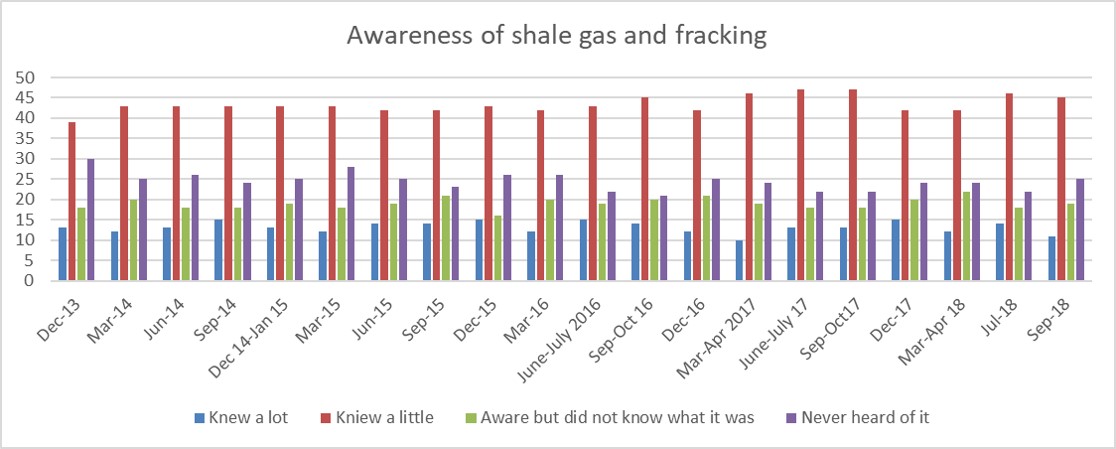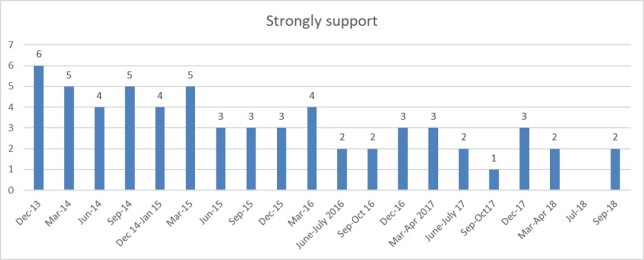
The government has resumed its quarterly survey of public attitudes to fracking and shale gas. The latest results, published this morning, show support for fracking stands at 15%, down 3 percentage points, and opposition at 31%, down 1 point.
The previous Wave tracker survey, published in August 2018, dropped questions, for the first time since 2013, on whether people supported or opposed fracking.
At the time, the Department for Business, Energy and Industrial Strategy (BEIS) said the questions would be asked only annually in future to allow space for “more focused questions” on subjects, such as consumer issues or employment rights.
But BEIS explained last week why the questions were returning:
“With the UK entering a new era of shale gas exploration it is only right that we routinely gauge the opinion of the British public and so the questions on supporting/opposing shale gas development will return to each quarter of the tracker.”
The fieldwork for today’s results was carried out before a series of earth tremors linked to Cuadrilla’s fracking at Preston New Road near Blackpool.
Support
15% of those surveyed said they supported fracking, the second lowest level recorded since the question was first asked nearly five years ago.
The latest figure was down 3 percentage points on the result for March-April 2018 when the question was most recently asked. It was up on the record low of 13% a year ago. Strong support for fracking remained unchanged at 2%.
The gap between support and opposition has returned to the level last seen in summer and winter 2017.

Who supports fracking?
BEIS said men were more likely to support fracking than women: 20% compared with 10%. Other groups more likely to support fracking were:
People aged 65 and over (20%) compared with people aged 16-24 (11%).
People with household incomes of £50,000 (21%) compared with people with household incomes up to £16,000 (15%).
People living in the East Midlands (21%) compared with people living in Northern Ireland (6%).
Why support?

The most common reasons to support fracking were:
- The need to use all available energy sources (36%)
- Reduce dependence on other fossil fuels (25%, down from 31%)
- Good for local jobs and investment (23%, up from 19%)
- Reduce dependence on other countries for energy (23%, down from 36%)
- Cheaper energy bills (17%, down from 26%)
Community benefits and the shale wealth fund were among the least common reasons to support fracking (4% and 1%).
Opposition
31% of participants opposed fracking.
This was down 1 percentage point on March-April 2018 when the question was most recently asked and down from the record high of 36% a year ago. But opposition to fracking has remained about 30% since March 2016.
Strong opposition was down 1 percentage point to 12%.
Who opposes fracking?
The survey found that people in social grade AB were more likely to oppose fracking than people in social grade DE: 39% compared with 25%.
Geographically, the people most likely to oppose fracking, according to the survey, were those living in Wales (41%), the North West (38%) and Scotland (36%).
People who said they knew a lot about fracking were more likely to oppose than support (58% compared 24%).
Why oppose?

The most common reason for opposing fracking were:
- Loss or destruction of natural environment (58%, up from 57%)
- Not a safe process (27%, down from 29%)
- Risk of earthquakes (26%, down from 29%)
- Too much risk and uncertainty (25%, down from 28%)
- Risk of contamination to water supplies (25% down from 31%)
Neither support nor oppose

Half those surveyed said they neither supported nor opposed fracking, the highest recorded by the survey so far. This was up slightly on the 47% when the question was most recently asked (March-April 2018).
The main reason for neither support nor opposing fracking was a lack of knowledge about it (77%).
4% said they did not know whether they supported nor opposed, unchanged on the survey when this was last asked.
Awareness

75% of people said they were aware of fracking. This is down slightly on the 78% recorded in the most recent survey and in September 2017.
11% said they knew a lot about fracking, 45% said they knew a little and 19% were aware but did not really know what it was. 25% said they had never heard of fracking.
BEIS said the awareness was higher among people aged 65 and above (86%) than in 16-24 year olds (56%). It was also higher among people in social grade AB (87%) than among people in social grade DE (61%).
Awareness was also higher among people with household incomes of £50,000 and over (89%, compared with 70% among people with household incomes up to £16,000).
People living in the north west and Wales had higher level of awareness (83%) and those living in London (56%).
Reaction
A spokesman for Frack Free Lancashire said:
“The widening gap between opposition and support is hardly surprising and neither is the fact that more than twice as many oppose shale gas as support it.
“This polling clearly shows that acceptance of the industry’s claims for shale gas benefits is vanishing even amongst their supporters.“Support for the idea amongst those backing fracking that shale gas might lead to a reduction in dependence on other countries for UK’s energy supply has collapsed from 36% in March to just 23% in September. Similar falls can be seen for the claims that shale gas will reduce dependence on other fossil fuels (25% compared to a previous 31% ), with the same story for the claim that fracking may result in cheaper energy bills (17% compared to a previous 26% ).
“It would appear that people are at last seeing through the industry’s spin, and once the impact of the recent earthquakes and the IPCC’s warnings regarding climate change filter through we would expect the gap between opposition and support to widen again.”
Methodology
The fieldwork was carried out from 19-30 September 2018 on the Kantar TNS Omnibus. The results of the Wave 27 tracker are based on face-to-face home interviews conducted with a representative sample of UK adults aged 16+. The sample size, of 4,258, was more than double that used when questions about attitudes to shale gas were previously asked (March-April 2018).
Categories: Research





Opposition dropped from 36% to 31% over the course of a year despite all of the propaganda and hyperbole.
Nuff said.
…….while support has dropped over 10% in four years……..
That telephone box meeting place will be replaced by shoe box soon…..
In case you missed it, fracking is happening. That is the status quo. A shrinking minority opposing that status quo isn’t going to change that.
The louder they shout their propaganda and the more ludicrous their opposition, the less popular they are. It’s a fact demonstrated by the drop from 36% opposition to 31%.
Last one out, turn off the lights.
DoD soon to be rebranded as DoDo.
errr; not heard much on the grapvine this week…all stop?
The way the cons are going they will be out before you know it and then fracking is banned; enjoy the acid trip whilst it lasts.
California’s biggest wildfires ever; climate change is catching up with the middle earthers, change is coming.
Reblogged this on nearlydead.
Unsurprisingly the reasons given for supporting fracking were the usual drivel promoted by the Tory press.
Seriously how many jobs would have to be generated in Lancashire to balance the tens of thousands destroyed in the tourist and farming industries should the Bowland Shale pedl be turned into the largest onshore gasfield in Europe?
These people are just clueless tory clones!
I am in total agreement & farming may be ruined also, the Cons are clueless & very greedy!
Yep-the tourist industry is really suffering around Europe’s largest onshore oil field! And the house prices! And the wild life sanctuaries! And the agriculture! (Check for yourselves-that was irony.)
Perhaps not so clueless, but look at reality rather than speculation.
‘Yep-the tourist industry is really suffering around Europe’s largest onshore oil field!’
And the house prices!
What about Europe’s largest gas field.
https://www.dutchnews.nl/news/2018/01/latest-groningen-earthquake-triggers-nearly-3000-insurance-claims/
Great tourist destination and ideal place to set up home.
https://dwarshuis.com/earthquakes-groningen-gas-field/visualisation/
Things not looking good for Cuadrilla trying to get into the Netherlands gas industry.
‘But that decision may be taken on the basis of the new Mining Act (valid since 2017), and environmental considerations can be a reason to refuse a permit. The environment was already the reason for the moratorium on shale gas.’
https://www.schaliegasvrij.nl/